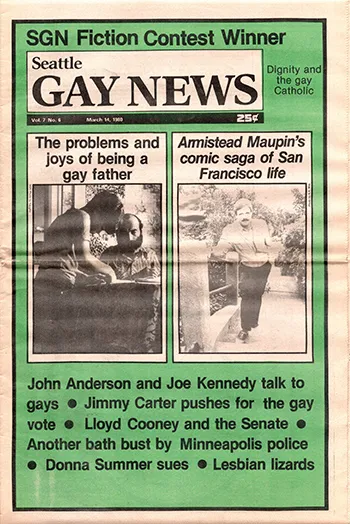
Dive into the archives of the SGN at https://issuu.com/sgn.org
SEATTLE GAY NEWS
VOLUME 7, ISSUE 6
MARCH 14, 1980
When a man in mid-life with a wife and children suddenly makes the discovery that he is gay, where does he turn for guidance and support? Until very recently, the answer was "nowhere," except to expensive counseling centers. According to Gay Fathers Support Group facilitator Phil Harrington, this is an extremely critical period. "Many feel 'I'm the only one,'" he said, referring to the role of a gay man in the husband/father situation.
At a meeting early in February, the GFSG celebrated its first year as a group. Between servings of cake (a gift from a local church) and champagne, Harrington told the 14 fathers in his home that "over 60 have taken advantage of this group. This is our first anniversary, and I'm glad we're still doing it." To the first-time men in attendance at the anniversary meeting, Harrington explained the purpose of the GFSG: "We don't care if you're gay, bisexual, or don't even know what your sexual orientation is. We don't encourage people to make any decision as to their marriage or lifestyle. What we do is let people see the diversity that exists. We all have neat things and difficult things in our life, and we share these together." He told the new fathers what they might expect from a meeting. "At a typical meeting, each father takes five minutes to introduce himself and tell the others what kind of space he is in. From there the meeting just takes off."
Harrington reviewed the genesis of the GFSG. "When I was coming out and going through my divorce, I received lots of help from the counseling center. It was good help, but it wasn't peer help. [...] I was aware of a real sense of isolation. I had straight values, 32 years old, and didn't know how I would fit. [...] Then I went to the San Francisco Gay Pride March in 1978. They had a fathers group on a float with their children. When I came home, I put my ideas together [...] and started getting calls. [...] After a few meetings, [...] I started getting calls from mental health groups around town, and they wanted to know if they could refer people. [...] I got invaluable information from the Lesbian [Mothers'] National Defense Fund. They told me what they do, and their methods and resources became open to us." [...]
And before long the GFSG won national and local approval. "We're now listed as a resource with the National Gay Task Force," said Harrington. In Seattle, "the gay community has really pulled together to support the GFSG, especially the professionals – doctors and mental health workers." Research groups, he explained, make contact with the GFSG because it is about the only way to make contact with gay fathers. "Child development researchers at UW and sex therapists did research with us." [...]
He believes the group has done a great deal of good for most of the fathers involved. "We consider it a success when an individual is confident, self-assured, virtually at peace with himself. For some it is for the first time in their lives." [...]
Sometimes the "reward" for some may be the start of a new relationship, though new friendships aren't always apparent to the group. [...] "We just can't meet everybody's needs. Some come looking for a structured format to find out about legalities, parenting, et cetera, and don't find it." [...]
Harrington also related actual incidents of fathers who have attended GFSG who have undergone electrotherapy, aversion therapy, and have been in mental institutions for no other reason than their homosexuality. [...] After discussing problems that gay fathers have confronted, he said. "The cruelest thing is the possibility that they will never see or be a parent to their children." [...]
"[L]ately we've started going out together socially and it's been great. Last year, we did a weekend at Fort Warden with the children. There were eight children, four fathers, and two others. The children did all the things kids do when they meet. It was summer Bible camp without the Bible. Some fathers were apprehensive of exposing their children to a gay lifestyle, but what happened to the children was no [exposure to a] lifestyle in particular... just a group of men who cared a lot about each other." [...]
This article was edited for length. To view the article in full, visit https://issuu.com/sgn.org/docs/sgn_march_14_1980

